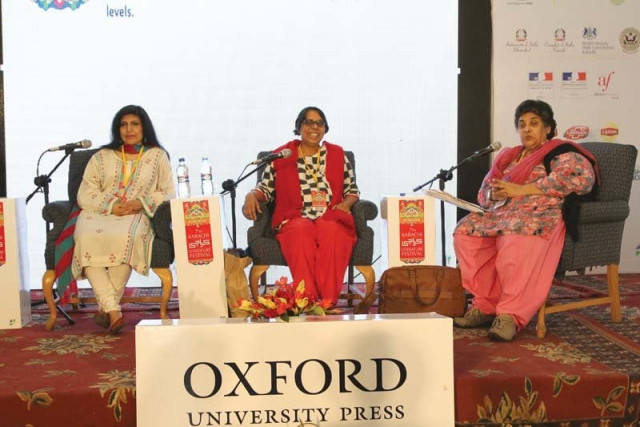Unchained melody of oppression
Speakers discuss 'discomforting' topics of child abuse, prostitution

Activists Fouzia Saeed and Ruchira Gupta in conversation with Shaheen Attiqur Rehman during the session titled ‘Facing Wrongs and Seeking Rights: The Female Perspective’. PHOTO: AYSHA SALEEM/EXPRESS
She hurts, she hides, she cries. No one to listen to her unchained melody of pain, she thinks she is going insane.
Breaking the silence, the speakers of ‘Facing Wrongs and Seeking Rights: The Female Perspective’ session highlighted the significance of discussing ‘discomforting’ topics of child abuse and prostitution. The session was held on the third day of 7th Karachi Literature Festival.
The session started with the moderator, Bunyad Literacy Committee Council vice-chairperson Shaheen Attiqur Rehman, narrating an anecdote from her childhood. Rehman was sitting with a teary-eyed less privileged woman in a bus once. When Rehman inquired, the woman said that she has been diagnosed with tuberculosis, upon the knowledge her in-laws threw her out of the house so she had no option but to sell herself.
Minor girl found dead in wedding hall tank was raped, confirms medical report
“Women in South Asia live in a state of permanent exile,” said Apne Aap Worldwide founder and social activist Ruchira Gupta while addressing the predominantly female audience. She has also won an Emmy for investigative journalism on a documentary on sex trafficking, ‘The Selling of Innocents’.
Dome of silence
“We don’t talk about incest. Incest is a reality, whether you like it or not. We don’t talk about issues that the decadent society does not approve of. We don’t want to talk about child abuse. Women who are raped are condemned in the society. We have to break this silence. We have to be the voice of the voiceless.”
Rehman raised topics that the society chooses to ignore. Gupta and Saeed highlighted the power of raising collective voice.
Bill and Melinda Gates Foundation launched an AIDS campaign in India, said Gupta. However, the distribution strategy was actually protecting the male buyers and not the female ‘sex workers’. So, we raised our voices against the policy of the campaign, and it was changed, she added. “There is power in amplifying voices.”
On the other hand, Saeed shared her experience of filing a complaint of sexual harassment at her former place of employment. “Three years I put up with it but, once I started talking to other women, I realised we all had a similar experience.” Eleven of us, then ultimately filed the complaint, she claimed.
Getting the legislation on sexual harassment passed was another endeavour for Saeed. “Initially, the government did not want to sit us because we were using the word ‘sexual’, so we rephrased it as ‘code of conduct for gender justice.’” We should learn to strategise to bring people on board, she added.
'They want to go back to school': photographer shows life after rape in India
Innocence for sale
Gupta shared how she did not write on women’s issues earlier in her career. “I thought I will be trivialised at the workplace. So there was a big red-light district in my hometown (Kolkata) but I continued to ignore it. My education taught me not to empathise [with those who are marginalised]”, she added.
“Once, I was walking through the hills of Nepal and I came across many villages that did not have any girls from the age of 15 to 45. I asked the men, where the women were? And they told me, Bombay.” It was that moment of realisation that flesh trade happens in my country so I began investigating it, she explained.
“Women were being raped, physically tortured and all in plain sight.” Gupta then made a documentary and launched an NGO to eradicate sex trafficking.
On her research on traditional system of prostitution, Lok Virsa head and author of Taboo! The Hidden Culture of a Red Light Area Fouzia Saeed said that her journey started because of her love for dancing. “I noticed that whenever people are dancing, someone always remarks, ‘why have you opened up a brothel here?”
During the research, I came across the many biases surrounding the field. These women were named after swear words, yet the men who visited them remain anonymous, pointed out Saeed.
Published in The Express Tribune, February 8th, 2016.



















COMMENTS
Comments are moderated and generally will be posted if they are on-topic and not abusive.
For more information, please see our Comments FAQ